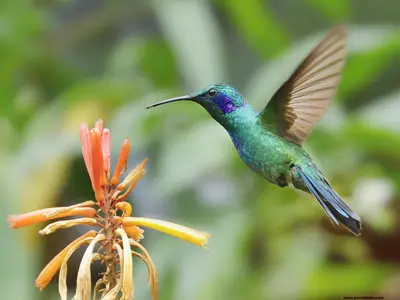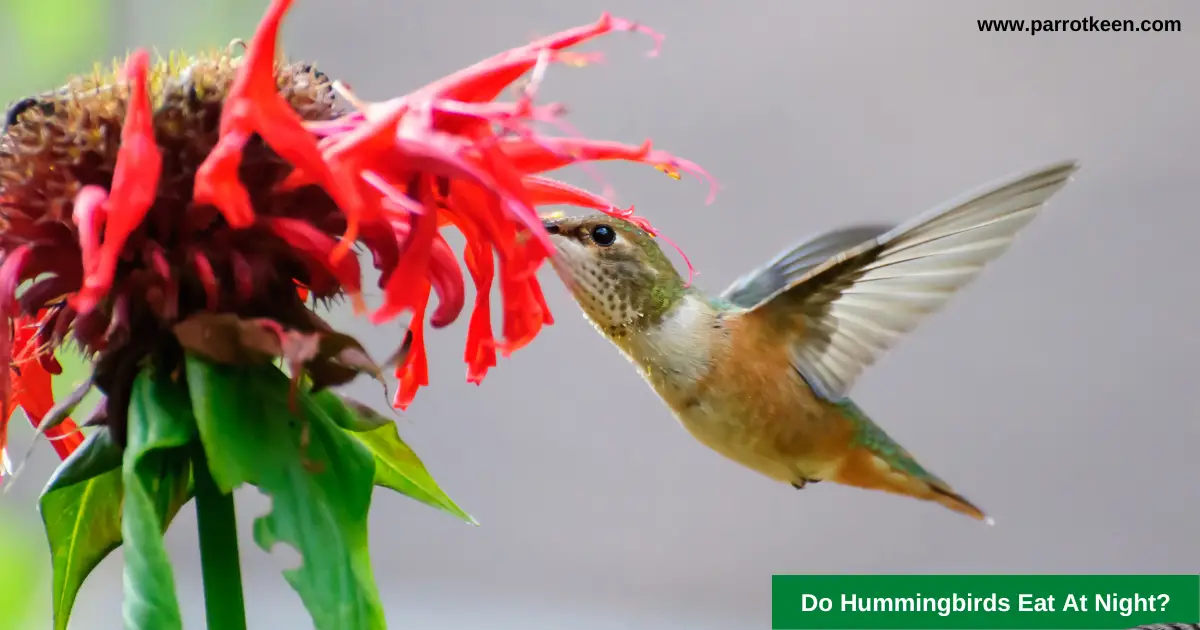
You may be asking the question, do hummingbirds eat at night? if your feeders are always empty in the morning.
A lot of people have inquired about this, and we’re going to go into more depth about it here.
As a rule, hummingbirds are not nocturnal and prefer to eat during the day rather than at night. Early in the morning and just before they go to sleep, they prefer to gorge themselves on food.
Obviously, they eat throughout the day but now is when they really fill up.
Hummingbirds have been observed feeding at night, but this is most common during the summer months. If you leave your outdoor lights on, you could catch a glimpse of a hummingbird or two.
These little birds also consume insects, which give them the protein they need. Hummers are known to forage insects at night, so you should keep an eye on them if they’re flying around at night.
When hummingbirds are migrating, they are the only birds that may be active at night. What happens to hummingbirds during the night?
Do Hummingbirds Eat At Night?
The answer to this question is no, hummingbirds do not eat at night. At night, Hummingbirds’ heart rates and body temperatures both fall to around 50 bpm. As a result, their respiration slows down dramatically.
To put it another way, this permits the hummingbird to save roughly 60% of the energy it usually expends.
Hummingbirds will select safe resting locations in the upper branches of a tree while in Torpor to protect their own safety. If the weather becomes cold, this will keep them safe from the elements.
They may even hang upside down from the trees during the day. For most hummingbirds, it takes at least twenty minutes for them to come out of their slumber.
When a hummingbird wakes up, the first thing it will do is feed. This is to make up for the energy that was expended sleeping.
A hummingbird’s daily caloric consumption peaks in the early morning hours, when it consumes about 25% of its total caloric intake.
How Often Do Hummingbirds Eat?
Every day, hummingbirds gather nectar from dawn until dusk. As the sun sets, they find a place to settle in for the night.
During the day, they need to eat regularly, they can eat between 3-7 times in the day, but at night and in the cold, they are able to slow down their metabolism and consume less energy.
Do Baby Humming Birds Eat At Night?
No, hummingbird babies do not eat during the night because they will be sleeping by then, however, they feed throughout the day.
Do Hummingbirds Eat At Night Time?
No, hummingbirds are known to sleep during the night, they enjoy sleeping and taking their nap during the night except for cases when they have a very long sea or water to cross. In this scenario, you can only see them flying during the night.
Do Humming Birds Drink At Night?
No, hummingbirds do not drink or eat at night. Usually, there are no activities in the night you can see hummingbirds carrying out, except for cases when they need to cross a big body of what, but hummingbirds are known to sleep during the night and at the same time do not like to be disturbed while sleeping.
Do Hummingbirds Need To Eat At Night?
No, the metabolism rate in hummingbirds is usually lower during the night, so they save energy and strength. There is no need to eat or drink during the night except for cases when they are on massive migration where they have expended much energy.
How Late At Night Do Hummingbirds Eat?
Hummingbirds do not eat at night, but they can eat from morning to dusk to gather enough energy and stamina they needed to survive during the night’s sleep.
Do Humming Birds Eat From Feeders At Night?
Hummingbirds generally do not feed at night. A good night’s sleep is important to them. Hummingbirds are more likely to be seen in the evening under brightly lit artificial environments. The bird catches insects drawn to the light, thus the unusual behavior.
Do Humming Birds Eat Bugs At Night?
You may see a hummingbird or two even if your backyard lights aren’t on. Additionally, hummingbirds feed on a lot of insects, which provide nourishment for small birds. Therefore, if you observe a hummingbird flying about at night, it might be catching insects.
Typically, hummingbirds are most active in the early morning and late evening and begin to settle in approximately 30 minutes before nightfall.
When the weather is warm, hummingbirds may feed into the night in some places, especially if there is artificial lighting like a porch light.
When The Sun Goes Down, What Are Hummingbirds Up To In The Dark?
Because their plumage provides only a small amount of insulation, hummingbirds do sleep with their wings fluffed while they are asleep.
For these birds, it’s all about body heat to keep them warm. A fast metabolism means nectar feeders need to eat frequently to maintain their energy levels.
You’ll often see hummingbirds hovering over feeders, flapping their wings furiously. When they go to bed at night, hummingbirds go into a state of semi-hibernation. This sleep disorder is referred to as torpor.
The hummingbird’s metabolic rate will be lowered during hibernation to achieve this. The hummingbird’s body temperature and heartbeat will both fall to about fifty beats per minute.
The hummingbird is able to save about 60% of the energy it would otherwise use. Female hummingbirds rest in their nests during the breeding season. In order to build these nests, the birds use horizontal tree branches.
It is unlikely that hummingbirds will nest near your property if you have a birdhouse because of their aversion to sleeping in cramped spaces.
Hummingbirds, on the other hand, will congregate in your yard if you use native plants to attract them.
During the night, hummingbirds will seek out the highest, safest branches of a tree to spend the night in peace. In the meantime, a hummingbird in a nearby tree may be perched upside down.
Getting out of hibernation, hummingbirds can take up to 20 minutes. Feeding is the first thing that a hummingbird does when it wakes up Hummingbirds have been observed feeding during the night, but this is more common in warmer weather.
Conclusion
Hummingbirds generally do not feed at night. A good night’s sleep is important to them. Hummingbirds are more likely to be seen in the evening under brightly lit artificial environments. The bird catches insects drawn to the light, thus the unusual behavior.
When hummingbirds are migrating, they are the only birds that may be active at night. This is due to the fact that some hummingbird species must fly over great distances of water. Since there is no place to rest and sleep, they will continue on their journey.
The fact that hummingbirds aren’t normally nocturnal means that they don’t have good night vision. It’s not uncommon for them to seek safety in a tree’s upper branches and fall into a profound sleep or state of hibernation.
While they’re sleeping, they’ll head to the nearest nectar source as the sun rises so they may refuel their bodies and minds.

